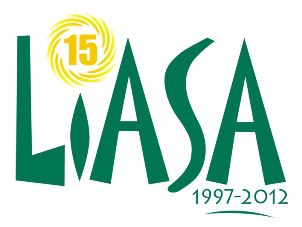You are hereby invited to submit proposals for papers & posters that will focus on areas related to the theme of the conference.
The 15th Annual LIASA Conference aims to provide opportunities to debate, share, and learn from local and international professional colleagues and partners. All relevant stakeholders and partners are invited to participate in discussions and workshops around the proposed topics. Papers based on case studies and best practice would be given preference. Papers and poster proposals on topics such as the following will be considered for inclusion in the conference programme:
LIBRARIES IN DIALOGUE FOR TRANSFORMATION AND INNOVATION
Human conversation is the most ancient and easiest way to cultivate the conditions for change – personal change, community and organizational change… dialogue are powerful tools for developing the capacity for deep, authentic conversation in organizations (Deepika Nath).
The golden thread weaved into transformation and innovation is dialogue which allows for the creation of flow and meaning through and between people. Dialogue is conversations between equals; it makes the implicit explicit; it is a change agent in relationships to create new grounds for mutual respect and collaboration. Dialogue is fundamental in building collective meaning and growing a sense of community and, enriching the spirit of collaboration.
Transformation is interpreted to be the change in thinking, change in practice, change in behaviour, change in engagements with the goal of nurturing a culture of innovation for a vibrant and better individual and contributor to national and global imperatives. The library as the epicentre of knowledge production and innovation must stimulate transformation for an improved quality of life for all.
South Africa has been on a positive political transformation trajectory since 1994. However, there has to be an extension of the political transformation agenda to include the development agenda which must be underpinned by open engagement with and between all stakeholders. The quadruple helix, that is, the library, government, civil society and the corporate world must collaborate to inspire and incite continuous and sustained dialogue en route to the development and strengthening of the transformation agenda: dialogue and transformation must become infectiously systemic.
It is beyond debate that information is the essential ingredient for dialogue and concomitant transformation. The core business of libraries is the acquisition, organization and dissemination of information. At the base of the formal learning hierarchy, school libraries are pivotal for a strong educational system. It is here that learners, exposed to appropriate, supplementary and complementary information are nurtured to become critical thinkers and active participants in a knowledge economy. Reinforcing critical thinking and participation in the knowledge economy is the people’s university – the public library. At the upper end of the formal learning hierarchy is tertiary education which, again, is totally dependent on libraries for success in producing active contributors to the national and global knowledge economy.
The growth and development of the library and information sector and the country demands ‘three-sixty’ dialogues with all within the quadruple helix: through dialogue will South Africa come out on the other side as economically and socially transformed and innovative.
The following are the sub-themes of the Conference:
Libraries in dialogue
Libraries and transformation
Libraries and innovation
Best practices in libraries
Libraries enhancing user experience
Libraries as an agent of change
School libraries and education
Academic and research Libraries
New modes of scholarly communication
Public libraries and social development
Libraries and civil society engagement
Special libraries
Libraries on the political agenda
Download current event:
Calendar file
In order to enable an iCal export link, your account needs to have an API key created. This key enables other applications to access data from within Indico even when you are neither using nor logged into the Indico system yourself with the link provided. Once created, you can manage your key at any time by going to 'My Profile' and looking under the tab entitled 'HTTP API'. Further information about HTTP API keys can be found in the Indico documentation.
Additionally to having an API key associated with your account, exporting private event information requires the usage of a persistent signature. This enables API URLs which do not expire after a few minutes so while the setting is active, anyone in possession of the link provided can access the information. Due to this, it is extremely important that you keep these links private and for your use only. If you think someone else may have acquired access to a link using this key in the future, you must immediately create a new key pair on the 'My Profile' page under the 'HTTP API' and update the iCalendar links afterwards.
Permanent link for public information only:
Permanent link for all public and protected information:
Please use CTRL + C to copy this URL
Detailed timetable



